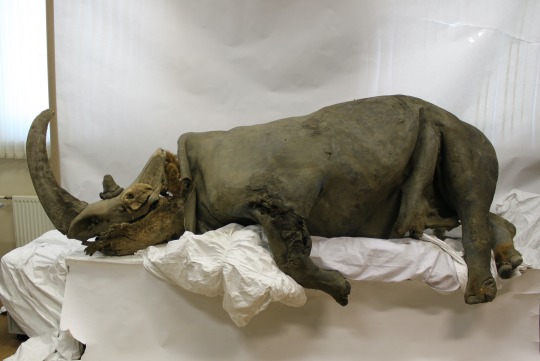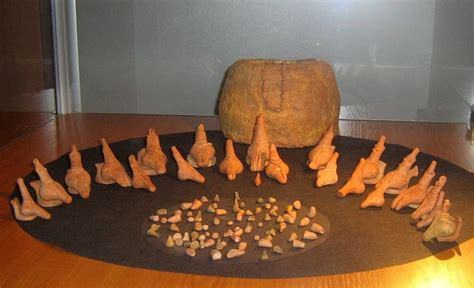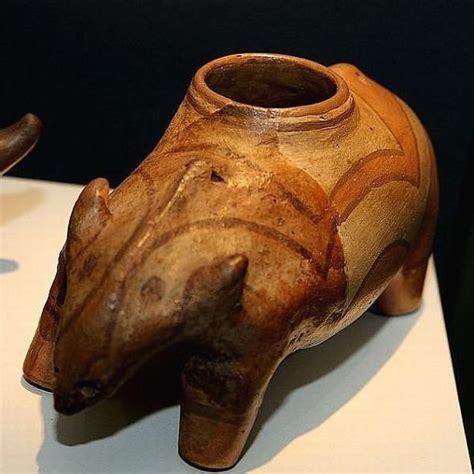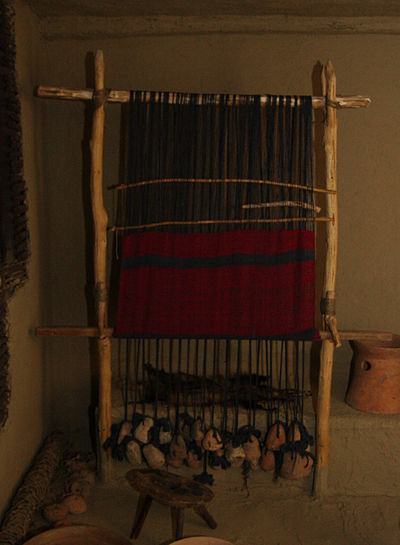Would a modern Neanderthal would be diagnosed with Autism? 20 winters old · autistic and schizoid · asexual and agender
Don't wanna be here? Send us removal request.
Photo

The Kolyma (Russia) Woolly rhino (Coelodonta antiquitatis), the only complete permafrost preserved adult woolly rhino known. It lived around 39,000 years ago. © Vladimir Filipov 2012
27K notes
·
View notes
Text
There's something weirdly satisfying about chopping up a raw carrot with a pocket knife and eating the little cubes. It feels weirdly primal, like, not something you have to think about. Simple.
Humans have been eating like this for tens of thousands of years. For the longest time, one's personal knife was also one's main eating utensil. You cut up meat and vegetables and passed the morsels to your mouth on the knifetip. Forks weren't invented until the Middle Ages, and even then not everyone had forks until recently.
I wonder if there are some behaviours that have been repeated for so long that all of humanity has this 'behavioural groove' that they can easily fall back into. I mean, it makes sense to literally everyone; you own a knife, there's vegetable before you, you're hungry, you don't need to be told what to do. I remember when I was younger, my family went camping, and one of the first things I remember doing was attempting to make a stone axe. I didn't really understand what I was doing, and didn't know how to make one, but I really wanted to, for no particular reason other than to just show it to people. It was really crappy. The next year, I tried to make another one. I dunno, maybe that's just me. But if you give someone a stick, they'll probably try to peel off the bark and smoothe out the gnarls, especially if they have a knife. There's no real reason to do this other than if you want to make a tool out of it. If you give someone some grass fibres, they might start absentmindedly weaving it into some abstract shape. Why start weaving grass unless you want to make a small basket? People who know nothing about wilderness survival do these things. It's like people naturally want to make, own, and use basic tools even if they don't know how.
Anyway this raw carrot is delicious
0 notes
Text
Today we live in a world where bigotry spreads fast through cultic imitation. Lately, I began to wonder how ancient peoples would have understood unfamiliar kinds of people. If you've never heard of something in your life, it's easy to be apprehensive, but hard to be truly hateful. So here's some hypothetical scenarios.
Neolithic Balkans; 6000 BC "Let me tell you. There was this group of traders and travellers who stopped here for a day. They'd come from down south, from the archipelago. Five men and three women. See, the sun's hotter down there, so they're all a bit tanned, though of course the men are more tanned than the women, so their culture isn't so different from ours. They all look a bit outland, but one woman catches my attention since she's taller than me, and we strike up a conversation. Now bear with me; you might not believe this. Turns out that she wasn't always a woman. She told me that she had once been a man, but somehow changed into a woman. Now, I'd never heard of such a thing, so was asking all kinds of questions. She said her body is like a man's, but that in all respects she lives as a woman. She has a husband at home and does most of her work indoors. I asked her how she came to change, and she said that manhood never felt right to her, and the gods told her in a dream that she would become a woman. Isn't that so interesting? What a wonderful world the gods have made for us."
Palæolithic West Asia; 20,000 BC "You want another one? Alright. I've been far looking for buyers, very far. I've wandered west over mountains and fields. If you follow the glacier west far enough, you'll find more temperate steppes. The people who live there look quite different from us. See, we're pale skinned, but they're dark brown, even the ones who live near the ice. Otherwise they look quite like us when it comes to noses, heads, and so forth. I was camping out by a river one night when a band of them came over. They seemed happy to see me. I think they'd probably seen one of my kind before, but I'd never seen one of them. They laughed when I stared at them; their teeth were quite clean and white, which stood out against their dark faces. Anyway, the next day they welcomed me to their camp and after we had a feast I presented some of my wares. They were very happy to buy my blue-gems, do you remember those? They were very generous and accomodating. Anyway, point is that not everyone in the world looks the same. I guess humans are animals after all, and animals come with different coat patterns. I've visited a lot of peoples, and while local customs vary, I've met no man that'll turn down a chance for a megaceros feast and some song and dance. People have diverse looks and ways, but ultimately everyone's the same animal. I'm old enough to know that."
Palæolithic Northern Africa; 12,000 BC "When most boys become men, they become attracted to women. But there's often a few men who, for whatever reason, don't really care much for women, and are fascinated with other men instead. Now, I don't understand what this feels like or why these men choose to be this way. But I know that it can be helpful for the community to have some of these men. Most men have women to attend to, and later babies and children. But men who like men don't have any children, so they can be depended upon for tasks that take a lot of time, like babysitting, trading, long hunts, and long fishing trips. Of course everyone wants to be at home, but these men can make a home for themselves anywhere, and aren't tied to their wife's living area. Men who like men tend to trust each other a lot, and some have this weird way of coordinating when it comes to hunting. Most men would argue over their share of a kill, but since they only need to feed themselves, they don't care for arguments, and often try to mediate the division. Although women are also often good at that, it's useful to have a man out at the scene of the hunt to stop the married men from clawing each other's eyes out over limited meat. Of course, the downside to having a man who likes men is that he doesn't make grandchildren for his mother and father. Thus, his parents will try to make another son who likes women. But since he has no duties to his own wife, a man who likes men can be a valuable uncle-babysitter, allowing his brother to go collect food and resources for his family, and do his duties as a man, and so on. Before you were born, the leader had a brother like that. His brother helped him to stay an active leader while he had three children and a wife. A strong leadership that was; we've fallen since then."
0 notes
Text
These fashy guys talk about the past as if their ancestors were kings and warriors. My guy, the vast majority were peasants. Statistically speaking, your ancestors were all peasant farmers or slaves. The elites were, and still are, a tiny minority.
And before you say "Oh I live in England in former Danelaw and have Scandinavian ancestry". It's unlikely that your ancestors were professional warriors. Warriors typically invade, loot, then retreat back to their homeland. The invasion makes way for peaceful peasant immigrants to make homesteads. Your Danish ancestors were likely a family of peasants who heard that their king was inviting immigrants to a land of opportunity across the western sea and so sold much of their property to hitch a ride on a ship.
It's fine to be proud of your ancestors. But don't misrepresent them. Depending on the era; they were probably agricultural peasants who were officially Christians but continued Pagan rituals without seeing them as antithetical. Before Christ, they probably recognised the main Pagan pantheons, but specialised in the worship of agricultural and fishing gods. One of your paternal ancestors likely owned a sword, bow, or spear and knew how to use it, but rarely (if ever) did for anything besides hunting. Your maternal ancestors probably wished there was something more to life than weaving, washing, and raising children, but believed it wasn't her place as a woman to desire such. Her father probably recommended her husband because he was of equally low status to her and seemed easy-going, and free people are expected to be married before 20 years old.
Things are a lot more mundane and complex than these big-bearded gurus tell you. Accept the mundanity and complexity of the ancient past or you'll forever be deluded.
You know how if you strongly idealise certain male Hollywood characters even though they're meant to be specifically very bad examples or showcases of evil? Like you're missing the point of the story if you idealise them. Anyway, I suspect it is the same phenomenon when some men strongly idealise Viking warriors or Proto-Indo-Europeans.
3 notes
·
View notes
Text
Viking weren't a army of proud warriors who nobly defeated the enemy. Many who travelled overseas were mostly karl bachelors who couldn't afford property or a wife and so made a living either trading or looting such from foreign communities. The stories you read about epic wars with heroes are mostly fantasy; exaggerated accounts of real skirmishes involving conscripted peasant armies. The majority of the conflict between Norsemen involved stronger villages plundering weaker ones for resources.
The proud blond-haired horseback armies racing off the steppes like the Mongols is an anacronistic myth. Most of early Indo-European colonisation was likely aided by divisions of young adolescent warriors (*kóryōs) who were instructed to behave like viscious carnivores (often wolves). They engaged in sporadic gang violence on foreigners. The indigenous peoples either had to ally with Indo-European tribes to spare themselves from attacks, flee, or die. This is called extortion.
Do you think that if you went back in time and visited one of these cultures, you'd become a warrior or a king or a poet? Sorry. If you just appeared back then one day, everyone would identify you as a foreigner, no matter your appearance. Your memorised reconstructed pronunciation of their language you spent so much time googling would be heard as an unfamiliar accent or speech impediment. You'd have no family or property, and likely insufficient skills or crafts, meaning you have essentially no status or power. Some petty lord with a few hundred head of cattle would enslave you to keep his livestock or work his plantation.
You know how if you strongly idealise certain male Hollywood characters even though they're meant to be specifically very bad examples or showcases of evil? Like you're missing the point of the story if you idealise them. Anyway, I suspect it is the same phenomenon when some men strongly idealise Viking warriors or Proto-Indo-Europeans.
3 notes
·
View notes
Text
Obviously it's misleading to say there are any objective 'villainous' cultures of history. But all I'll say is that if these guys went back in time and actually saw the Vikings or the Yamnayas for themselves, they'd think their ways were despicable and savage.
You know how if you strongly idealise certain male Hollywood characters even though they're meant to be specifically very bad examples or showcases of evil? Like you're missing the point of the story if you idealise them. Anyway, I suspect it is the same phenomenon when some men strongly idealise Viking warriors or Proto-Indo-Europeans.
3 notes
·
View notes
Text
You know how if you strongly idealise certain male Hollywood characters even though they're meant to be specifically very bad examples or showcases of evil? Like you're missing the point of the story if you idealise them. Anyway, I suspect it is the same phenomenon when some men strongly idealise Viking warriors or Proto-Indo-Europeans.
3 notes
·
View notes
Text
The Bear Taboo
The "bear taboo" is a very common thing in many languages and cultures, that the "true name of the bear" is rarely, or ever should be invoked. That a lot of tribes will just fear of death by just invoking of its name; as they beleive they were powerful spirits or deities on earth.
The English word for "bear" stems from the Germanic euphemism, which means "brown one" which is a general trend in many languages.
This cultural phenomenon goes back to Northern Proto-Indo-European tribes, and a lot of Uralic tribes too (Finns). This practice also exists in Siberian Indigenous cultures; such as the Evenk or the Sakha.
92 notes
·
View notes
Text
Are these the oldest words in the world?
Such a thing is lost to time. Languages don't fossilise, ater all. They literally fly into the air and disappear. If such a language left descendants, we can do comparative reconstruction, but such is only useful for language families younger than about 10,000 years. But, sometimes all it takes to imply a deeper connection is a handful of resiliant lexical items, like pronouns or grammatical suffixes.
We find a few common features among unrelated Eurasian language families which have perplexed linguists and begotten several wild theories. The features I've been able to find are;
a first-person pronoun beginning with a labial nasal followed by a high vowel mi, me
a second-person pronoun beginning with dental t- or s-
a nasal oblique case suffix in -m or -n
a plural number suffix in -t or -s
I've gathered some examples; I've tried my best to make these all as accurate as possible.
Proto-Indo-European:
*h₁me "me"
*tuh₂ "you" (singular)
*-m (accusative case)
*-es (plural marker)
Proto-Uralic:
*mi "I"
*ti "you" (singular)
*-m (accusative case), *-n (genitive case)
*-t (plural marker)
Proto-Turkic:
*be "I", *men "me"
*se "you" (singular)
*-n (pronominal oblique marker)
*-z ~ *r (possessive suffix plural marker)
Middle Mongol:
bi "I", min- "mine"
ci "you" (singular), ta "you" (plural)
-(V)n (genitive marker)
-s, -(V)d (some plural markers)
Proto-Tungusic:
*bi "I", *min- "me"
*si "you" (singular)
*-n (pronominal oblique marker)
*-tV, *-sal (some plural markers)
Etruscan:
mi "I", mini "me"
(second person pronoun unknown)
-n (demonstrative accusative marker)
(resemblant plural marker not found)
Notes:
In Proto-Indo-European, the first person singular nominative is *eǵH(óm), which in no way resembles the rest of the paradigm, all in *h₁me ~ *h₁mo-. It was likely a later formation. This would be very sound if an ancestor to Indo-European had ergative–absolutive or active–stative alignment.
Turkic, Mongolic, and Tungusic have a common feature where the first person singular pronoun is b- in the nominative and m- in all other cases. It's likely that the m- is the more primal initial consonant.
Several explanations have been proposed for these correspondences. The first is that these are simply coincidences; which is improbable. The second is that some or all of these correspondences come from areal contact; i.e.; speakers of these Eurasian languages have been borrowing these very basic grammatical items from one another. This isn't impossible, but it's unlikely. It also doesn't adequately explain the similarities in Etruscan.
Others have attempted to unite these families into yet larger macro-families. Yet all of them have so far been unsuccessful due to lack of evidence. Indo-Uralic remains the most promising hypothesis here. Altaic (Turkic, Mongolic, Tungusic) was more popular in the past, but is now discredited. Etruscan has been repeatedly and unsuccessfully attributed to several language families; it appears to be an isolate.
But even if they can't be confidently proven; these similarities still exist.
The following is highly speculative, and likely unfalsifiable (it isn't scientific, but just an amateur opinion). It seems plausible that these language families are somehow more closely related to one another than any of them are to other families. But the connection may be truly ancient, beyond the reach of the comparative method. We may speculatively attribute these shared features to a hypothetical language spoken by either the first Homo sapiens in Eurasia or the Homo sapiens very early migrated into Siberia. Except for Etruscan—the linguistic groups here have in common that their original speakers all had at least some genetic ancestry of the Ancient North Eurasian classification.
We can know almost nothing about languages before 10,000 BC. But maybe, some truly ancient foragers living in the Mongolian mammoth steppes one called themselves mi and a listener ti. Whatever their origins, these two words are likely some of the oldest in the world. Maybe to others this isn't that significant, but to me it feels profound; as good as hearing the voices of people who have been dead for 20,000 years. They're like tiny little ghosts haunting modern languages to this day.
0 notes
Text
The freedom to abandon one’s community, knowing one will be welcomed in faraway lands; the freedom to shift back and forth between social structures, depending on the time of year; the freedom to disobey authorities without consequence – all appear to have been simply assumed among our distant ancestors, even if most people find them barely conceivable today. Humans may not have begun their history in a state of primordial innocence, but they do appear to have begun it with a self-conscious aversion to being told what to do. If this is so, we can at least refine our initial question: the real puzzle is not when chiefs, or even kings and queens, first appeared, but rather when it was no longer possible simply to laugh them out of court.
The Dawn of Everything: A New History of Humanity by David Graeber and David Wengrow
1K notes
·
View notes
Text
Thinking about her...







neolithic Ukraine my beloved
9 notes
·
View notes
Photo




my neanderthal and homo sapien gay couple and their adopted daughter (ocs) :’-)
1K notes
·
View notes
Photo

Dona Neanderthal feta el 2009 per l’exposició-La Parla - de Fundació “la Caixa”. Cedida @macarqueologia. Ara a l’exposició itinerant “Art Primer, artistes de la prehistoria” @arqueoxarxa @museudegava #neanderthal #neanderthaler #neanerthalensis #caveman #urmensch #urmenschen (at Gavá, Cataluna, Spain) https://www.instagram.com/p/Cph-mluotpR/?igshid=NGJjMDIxMWI=
20 notes
·
View notes
Text
Her name is Rʼts!m. That's the name her mother gave her. It means 'the one who came late and kicked' in her family's language. She can pronounce it just fine, but others find it hard. When talking with those elves, she says her name is Rachel. Not that she likes to talk with them that much. It's nicer to speak with her family, who speak the same language as her, or with neighbouring troll families who speak similar dialects. That's the weird thing about elves; everyone in a town speaks the same dialect. Every troll family has their own personal familect. Go to the next town, they speak another language.
Besides, elf language is so confusing. You must put together so many words to express one thought. If Rachel feels cold and wants to go home, all she needs to say is dʼi, and her family understands. But in elf language, she must string together seven or eight words; I'm cold and want to go home. She doesn't bother when speaking elven; she just says cold.
Trolls don't use wheels. Wheels are dangerous. Wheels can crush people. Wheels can fall off. Wheels don't stop as soon as the power stops. But Rachel is open-minded. She rides a bike, one her grandfather made out of steel. It's bare for paint and heavy, but sturdy enough to have taken 60 years of hard use. Being a naturally brawny troll woman has its advantages when cycling. Say, she's generally faster in short bursts. She can haul more in the trailer. Elves, with their skinny straight running legs, can travel for much longer, but only the fittest can keep up with her on a hill climb.
She winds up the slope and the houses fall behind her. She breaks away from the road and travels down a long dirt path around a hill. On the side facing away from the town, there's a huge ocre deposit which only a few families know about; not even the elves know. She parks the bike beside it, grabs a shovel from the trailer, and digs up the grassy soil to uncover the red goodness beneath. She shovels as much of it as she can into the trailer, which doesn't take long thanks to her natural strength, then remounts and heads back.
She carefully inches down the hill on the way back. Although she isn't afraid of wheels, she's still a very cautious person. Trolls are generally quite cautious. She navigates the streets until she finds her family's home. After locking the bike, she detatches the trailer and pulls it up the step to the front door, which knocks some of the soil onto the street behind. An elf neighbour looks on with disapproval.
Stupid elves, Rachel thinks. They'll never understand. The elves don't like her kind out of general bigotry, but trolls don't like elves thanks to a broad suspicion of all foreign things. Stupid elves, with their flat faces, small eyes, bulging foreheads, and bony nubs beneath their mouths; 'chins' or whatever they call them. Standing tall over us trolls like they own the place. All skinny and gracile, yet eagre to tell us how to live. They look deformed. Where are their brow ridges? Their heads are too tall; their foreheads should slope back. Their teeth are so small, they'd break if they bit anything hard. I use my teeth for all sorts, Rachel thinks.
The elf sighs and looks away, then Rachel progresses into the house. Her two brothers and father are sitting about naked sharpening steel small knives; shaving razors, which they'll trade to other troll families. They turn their heads to see Rachel arrive; though they don't smile, she can tell they're pleased to see her, and the haul she brought back. She quickly throws off her clothes—they're only to be presentable to the elves and mean nothing to her personally—then her mother arrives and together the family begin scooping the ochre into tupperware pots and grinding them with the handles of screwdrivers. They drip water from bottles and every now and then spit into the mixtures. The ochre clumps turn into paste. Rachel's is a bit runny, but she doesn't mind.
The family, with dusty red hands and noses, silently rise, dip their fingers into the tupperware pots, and trace them over various patches of wall throughout the house. They paint lines weaving in random directions, circles, loops, and zig-zags. Their works don't particularly resemble anything, and seem almost like a child's drawing. Yet they are satisfied with their work.
By the end of the day, the house is covered in orangey-red lines and smells like dust. Rachel's father starts a fire and the family gather about it to watch the flames. They say very little; only news and other practical information. None of them smile. Yet they're all happy, and can tell that the others are happy. The darkness falling about her and the smell of wood smoke triggers a primal sense of relaxation. One by one, they fall asleep in their new cave—hopefully their home for years to come.
0 notes